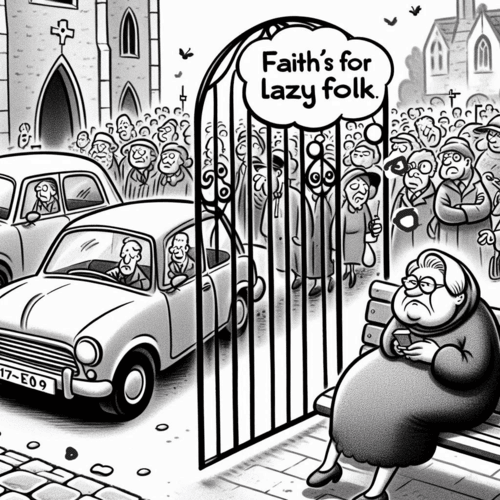Does God Hate Sin but Love the Sinner?
Editor’s Note: This post is part of our series, ‘Satan’s Lies: Common Deceptions in the Church Today’…
“God hates the sin but loves the sinner.” This phrase has become so commonplace in Christian circles it’s often accepted without question. It sounds compassionate and merciful, Indeed, everyone agrees God hates sin—this is beyond dispute in Christian theology. But the second part of the popular saying—that God nevertheless loves the sinner—deserves careful scriptural nuancing.
As we shall discover through God’s Word, the well-intentioned phrase represents one of Satan’s most effective lies infiltrating the church today. Not only does it lack explicit biblical support, but it actively contradicts numerous passages that reveal God’s actual attitude toward those who practice evil. The deception lulls souls into a dangerous complacency, undermining the urgency of genuine repentance and faith in Christ…
THE ORIGIN OF THE PHRASE
The phrase “God hates sin but loves sinners” appears nowhere in the Bible. The phrase, however, has deep roots, tracing back to St Augustine’s Letter 211 (c. 424 AD), where he wrote, “Cum dilectione hominum et odio vitiorum”—“with love for mankind and hatred of sins.” Augustine was instructing nuns in Carthage on how to discipline wayward sisters, urging them to correct sin while preserving love for the person.
Today, the phrase has gained widespread popularity in contemporary evangelical culture, largely as an approach to show compassion toward those struggling with persistent sin. The intention is understandable. It is to prevent people from feeling completely rejected by God while encouraging them to turn from sinful behaviour. However, can good intentions justify theological error, especially when souls hang in the balance.
DOES GOD LOVE THE SINNER? SCRIPTURE SUGGESTS YES AND NO
Scripture presents a more complex picture than the popular phrase suggests. Consider these direct statements about God’s attitude toward sinners:
- Psalm 5:5-6: This passage doesn’t separate the sin from the sinner—God explicitly “hates all evildoers” and “abhors the bloodthirsty and deceitful man,” not just their actions.
- Psalm 11:5: Again, God’s hatred is directed not merely at wickedness as an abstract concept, but at “the wicked” themselves—the people who practice evil.
- Proverbs 6:16-19: While this passage begins with abstract concepts, it concludes by identifying people themselves as objects of divine hatred—”a false witness” and “one who sows discord.”
These verses and others like them directly contradict the popular notion that God somehow separates sinners from their sins in His attitude toward them. Scripture repeatedly indicates God’s displeasure extends not merely to the evil itself, but to the persons themselves who commit it.
GOD’S LOVE, A THREEFOLD DISTINCTION
So, does God love the sinner? To help us navigate these challenging truths, Reformed theologian RC Sproul provides a helpful framework for understanding the different ways Scripture speaks of God’s love.
God’s benevolent love: This love refers to God’s general care for all creation (Matthew 5:45). “For he makes his sun rise on the evil and on the good, and sends rain on the just and on the unjust.” This form of love is God’s disposition to provide for His creation and to desire its good in a general sense.
However, benevolent love doesn’t imply approval or acceptance of sinners as they are. It’s a divine attribute that allows God to sustain even those who rebel against Him, providing them opportunity to repent. But it shouldn’t be mistaken for complacent acceptance of their sinful state.
God’s beneficial love: God’s beneficial love describes His active goodness toward His creatures. As Acts 14:17 states, God “did good by giving you rains from heaven and fruitful seasons, satisfying your hearts with food and gladness.” This is often called common grace—the blessings God bestows on all humanity regardless of their spiritual state.
Here again, beneficial love doesn’t negate God’s hatred of sin and sinners. It demonstrates His patience and mercy, giving people time to repent rather than immediately executing judgement (2 Peter 3:9). However, this shouldn’t be mistaken for approval or permanent withholding of judgement.
God’s exclusive love for those who are His: Sproul called this God’s ‘complacent’ love—His delight, joy, and pleasure in His people—is reserved exclusively for those who are in Christ. This is the special love described in Ephesians 1:4-5: This love involves God’s active delight in His elect, a love that leads to their salvation.
This crucial distinction reveals the error in telling unrepentant sinners “God loves them.” In their natural state, outside of Christ, they remain under God’s wrath (John 3:36) and cannot claim His complacent love. Only through union with Christ do sinners become objects of God’s special, salvific love.
THE DANGER OF SATAN’S DECEPTION
Satan’s strategy has always involved mixing truth with error. The partial truth that God demonstrates benevolent and beneficial love toward all creation becomes a dangerous deception when it’s presented as the complete picture of God’s disposition toward sinners.
When we tell unrepentant sinners God loves them but hates their sin, we unwittingly advance one of Satan’s most effective lies. The half-truth creates false security, suggesting that regardless of one’s response to Christ, God’s ultimate attitude is one of love and acceptance.
Consider the devastating consequences:
- It diminishes the seriousness of sin by implying sin doesn’t fundamentally alter God’s disposition toward the sinner.
- It removes the urgency of salvation by suggesting God’s love is already secured regardless of one’s relationship with Christ.
- It contradicts clear biblical teachings about God’s wrath remaining on those who reject Christ (John 3:36).
- It makes the cross seem optional rather than necessary—if God already loves sinners fully, why was Christ’s sacrifice needed to reconcile them?
Satan uses the lie to lull sinners into spiritual complacency, convincing them their standing before God is secure when in fact they remain under divine judgement.
CONCLUSION: DOES GOD LOVE THE SINNER?
“God hates the sin but loves the sinner” is a dangerous oversimplification that has more in common with modern therapeutic sentiments than biblical truth. Scripture presents a God who indeed hates both sin and those who practice it, while simultaneously providing a way for sinners to become objects of His special, saving love through union with Christ.
The gospel’s urgent call isn’t “Rest assured, God already loves you just as you are,” but rather “Be reconciled to God through faith in Christ before it’s too late.” Satan’s deception has weakened the church’s witness by dulling the sharp edge of God’s wrath and of the gospel’s call to repentance. By returning to the full biblical teaching we can reclaim the urgency and power of the Christian message. The world desperately needs truth rather than comfortable lies.
DOES GOD LOVE THE SINNER? RELATED FAQs
How would Arminians and Molinists answer the question in our title?
Arminian theologians, such as Roger Olson, affirm God loves all sinners universally with redemptive love, based on passages such as John 3:16 and 1 Timothy 2:4. They argue God hates sin but not the sinner, as His prevenient grace enables all to respond to the gospel. Unlike the Reformed view, Arminians see God’s love as extending equally to all, with wrath reserved for those who ultimately reject Christ.
Molinists like William Lane Craig propose God loves all sinners and desires their salvation, using His “middle knowledge” to place them in circumstances where they might freely choose Christ (1 Timothy 2:4). They hold God hates sin but loves the sinner’s potential for redemption, balancing divine sovereignty and human freedom. This contrasts with the Reformed emphasis on God’s particular love for the elect and His hatred of unrepentant sinners (Psalm 5:5).
‘Does God love the sinner?’ How would prominent contemporary Reformed theologians answer?
- John Piper emphasises God’s hatred of sinners (Psalm 5:5) and His love (John 3:16) coexist in His complex nature. He argues God’s wrath abides on the unrepentant, but His offer of mercy through Christ reflects a genuine desire for their salvation. Piper clarifies this love isn’t sentimental but rooted in God’s sovereign will to save the elect.
- Tim Keller: The late pastor, cautioned that while Augustine’s phrase is theologically sound, it can be misapplied pastorally, sounding judgemental. He advocated showing Christ’s compassion to sinners while upholding God’s holiness, balancing truth and grace. Only through repentance can sinners experience God’s redemptive love.
- Kevin DeYoung distinguishes God’s general benevolence (common grace) from His covenant love for the elect. While God shows kindness to all (Matthew 5:45), His saving love is reserved for those in Christ (Ephesians 1:4-5). DeYoung warns against universalising God’s love, as it risks diluting the exclusivity of the gospel.
- Joel Beeke, drawing on Puritan theology, affirms Puritans like Jonathan Edwards taught God’s hatred of sinners due to their rebellion (Psalm 11:5). Apart from Christ, sinners are under divine wrath, but God’s electing love transforms the redeemed into objects of delight.
- Sinclair Ferguson explains that God’s “hatred” of sinners (Psalm 5:5) is not human-like vindictiveness but a holy opposition to sin. God’s love and wrath aren’t contradictory, as His benevolent love sustains all, while His redemptive love saves the elect. Ferguson underscores the cross as the resolution of this tension.
- Michael Horton highlights common grace as God’s benevolent love that benefits all people, regenerate or not (Matthew 5:45). He clarifies this doesn’t imply salvific love, as unrepentant sinners remain under wrath (John 3:36). Horton warns against conflating common grace with God’s special grace for the elect.
How do the Canons of Dort inform the Reformed view on God’s disposition toward sinners? The Canons of Dort affirm God’s just hatred of sinners due to total depravity (Romans 3:10-12) while upholding His sincere offer of salvation to all who believe. God’s love is particular for the elect, but His gospel call reflects a benevolent desire for repentance, not universal salvation.
DOES GOD LOVE THE SINNER? OUR RELATED POSTS
Editor’s Pick

Will There Be a Third Jewish Temple in Jerusalem?
Throughout history, God's dwelling among His people has taken several forms—from the wilderness tabernacle to Solomon's magnificent temple, to its [...]

Filled Vs Baptised With the Spirit: What’s the Difference?
Baptised with the Holy Spirit vs. filled with the Spirit: are these simply different terms for the same spiritual experience, [...]

Joshua & Yeshua: Exploring the Name and Life Connections
When we encounter names in Scripture, they often carry profound theological significance. None more so than the name shared by [...]

Can Evil Spirits Read Minds? What Scripture Actually Teaches
Ever worried Satan or his demons can see your thoughts? Perhaps you’ve had a sinful thought and immediately felt exposed, [...]
Does a Husband’s Faith Save His Family? Acts 16:31 Explained
"Believe in the Lord Jesus, and you will be saved, you and your household." This promise in Acts 16:31 has [...]

Did Jesus Die Too Soon? Was Pilate’s Surprise Unfounded?
Sceptics point to Jesus' relatively short time on the cross as evidence the Gospel accounts are unreliable. After all, when [...]

Shouldn’t the Book of Enoch Be In the Bible? Why Isn’t It?
The Book of Enoch has fascinated scholars, theologians, and curious readers for centuries. Mentioned in the New Testament and revered [...]

‘Out of Egypt I Called My Son’: Did Matthew Misuse Hosea 11:1?
When Matthew quotes Hosea 11:1 in his Gospel—“Out of Egypt I called my son”—he draws a connection that has puzzled [...]

Bible Allusions: How They Enrich Our Grasp of God’s Word
Ever experienced that moment when you're reading Scripture and suddenly recognise an echo of another passage? That spark of recognition [...]

Old Testament Theophanies: What Purposes Did They Serve?
Throughout the Old Testament, we encounter remarkable moments when God manifests Himself in visible, often tangible forms to His people. [...]






